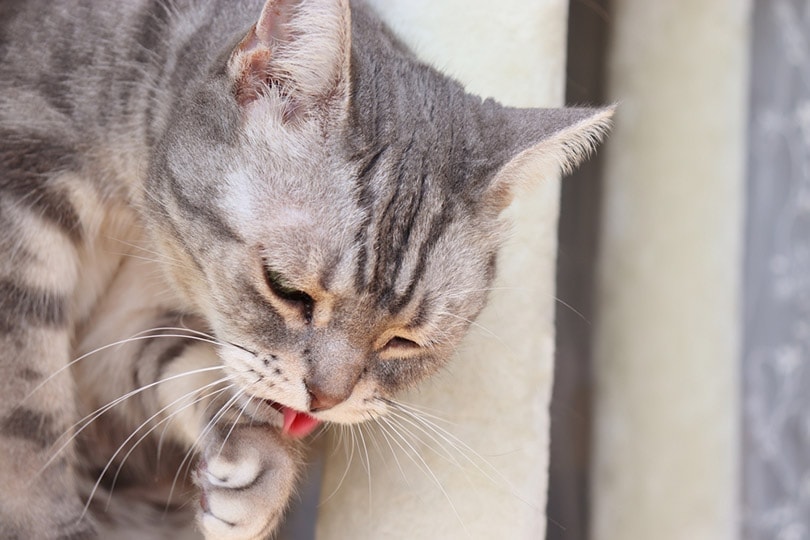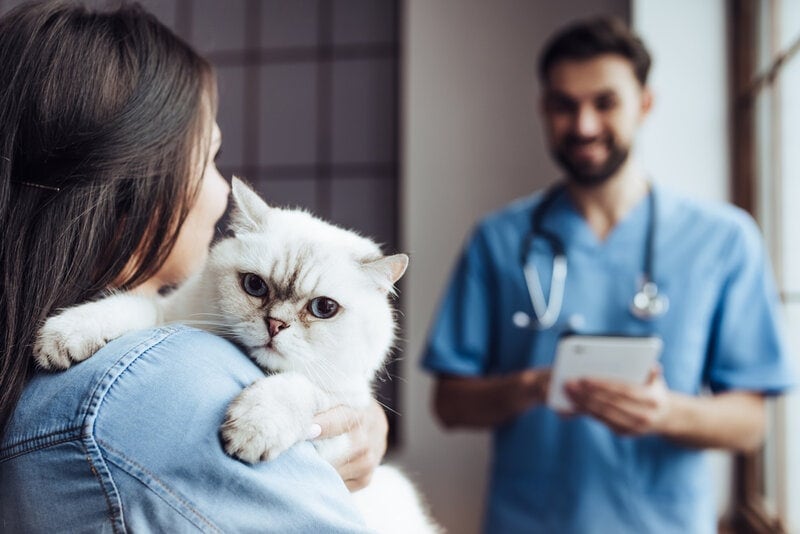Why Is My Cat Throwing Up? Our Vet Answers
By Dr. Leigh Wilder, DVM (Vet)
Updated on

Click to Skip Ahead
It is not uncommon for a cat to vomit occasionally, but when vomiting becomes a regular occurrence or other signs of illness appear, you should schedule an appointment with a veterinarian.
Vomiting was the third most common pet insurance claim for cats in North America in 2020. It can be a tricky symptom to interpret because there are so many possible causes. Vomiting can be due to something as simple as a hairball or reflect a more serious medical condition. If you are concerned about your cat’s vomiting, it’s best to seek veterinary attention sooner than later.
Vomiting vs. Regurgitation
Vomiting is an active process. It starts with a feeling of nausea, followed by retching (heaving), and finally a forceful ejection of material from the stomach and upper small intestine. There are usually clues that a cat is about to vomit before it actually happens. They may drool or lick their lips, visibly swallow multiple times, appear uncomfortable or restless. Many owners will attest that their cat always seems to have enough time to find a lovely soft carpet or rug on which to vomit.
Regurgitation is more passive. There is no nausea or retching, and the material brought up comes from the stomach or esophagus. A classic example of regurgitation is a cat bringing up undigested food after eating too quickly.

What Are Some of The Causes of Vomiting In Cats?
This list is by no means exhaustive, but here are some of the common reasons cats vomit:
- hairball
- internal parasites
- side effect of medication (e.g., antibiotics)
- gastrointestinal (GI) irritation (e.g., after eating certain plants)
- ingestion of a toxic food or substance
- obstruction due to a foreign object(s)
- constipation
- food intolerance
- inflammatory bowel disease (IBD)
- medical conditions (e.g., pancreatitis, kidney or liver disease, diabetes, hyperthyroidism)
- tumor(s) in or near the GI tract
When Should I Seek Veterinary Attention?
Anything other than occasional (less than once or twice per month) vomiting should be evaluated by a veterinarian.
If you need to speak with a vet right now but can’t get to one, head over to JustAnswer. It’s an online service where you can talk to a vet in real time and get the personalized advice you need for your pet — all at an affordable price!
- vomiting multiple times in one day
- unable to keep food or water down
- bright red blood or “coffee grounds” (digested blood) in vomit
- diarrhea in addition to vomiting
- lethargy (extreme tiredness) or weakness
- ataxia (incoordination)
- excessive drooling
- not eating for 24 hours
- fast breathing, abdominal effort with breathing, or difficulty breathing
If you’re not sure whether your cat needs to be seen, you can always call a veterinarian for advice. However, it never hurts to bring your cat in for an exam if you are concerned. Most veterinarians would rather be cautious than risk waiting and your cat becoming more ill.
A vomiting kitten should always be evaluated right away!
Kittens can quickly become dehydrated, develop low blood sugar, and may struggle to regulate their body temperature.

How Will the Veterinarian Figure Out Why My Cat Is Vomiting?
1. The veterinarian will start by collecting a thorough history.
- how long has the vomiting been happening?
- how frequently does your cat vomit?
- what does the vomited material look like?
- what does your cat’s diet consist of?
- is your cat taking any medication or supplements?
- has your cat been previously diagnosed with a medical condition?
- does your cat have access to plants or other possible toxins?
- is your cat known to eat things they shouldn’t?
- does your cat live strictly indoors, or do they go outside?
2. Next, they will perform a complete physical examination.
The veterinarian will check your cat from nose to tail, but in cases of vomiting they will particularly focus on:
- assessing hydration
- checking for foreign material (e.g., string) in their mouth or throat
- palpating (feeling) their abdomen for abnormalities or tenderness
- determining whether they have a fever
3. Depending on their findings, they may recommend running some tests.
| Diagnostic Test | What Are They Looking For? |
| Bloodwork and urine testing |
|
| Fecal flotation (requires a stool sample, which is examined under the microscope) |
|
| Radiographs of the abdomen (x-rays) |
|
| Barium study
chalky white liquid is administered by mouth and followed through the GI tract by taking multiple x-rays |
|
| Ultrasound of the abdomen |
|
| Upper GI endoscopy
a flexible camera is used to inspect the inside of the esophagus, stomach, and upper small intestine (requires general anesthetic) |
|
| Surgical exploration of the abdomen
(requires general anesthetic) |
|
*Identifying a specific parasite(s) helps guide the choice of deworming medication and how many doses are needed. However, not all parasites shed eggs regularly. Your veterinarian may still recommend deworming even if no eggs are seen.
How Is Vomiting Treated?
Treatment of vomiting depends upon the underlying cause. A young cat with parasites who is otherwise healthy may only require deworming medication and some supportive care. Cats with GI obstruction may require surgery to remove a foreign object. Older cats with chronic medical conditions may require long-term treatment and monitoring.
Can I Help Prevent My Cat From Vomiting?
It is not possible to prevent all vomiting in cats. However, with reference to the initial list of causes, here are some steps you can take to help keep your cat’s gastrointestinal tract as healthy as possible:
- brush your cat daily to help prevent hairballs
- deworm your cat with a prescription medication according to the schedule recommended by your veterinarian, particularly if they go outside or have opportunities to hunt
- use a prescription flea prevention product (specifically for cats) to help avoid tapeworms
- administer any prescribed medication according to the label directions and notify your veterinarian if vomiting occurs
- don’t keep toxic plants in your home
- be aware of the foods that cats shouldn’t eat
- store all medications (human and veterinary) in a safe location, out of your cat’s reach
- don’t leave string, tinsel, hair elastics, rubber bands, or other small items where cats can potentially find them and eat them
- enlist your veterinarian’s help in selecting an appropriate diet for your cat
- keep your cat in ideal body condition to lower their risk of developing diabetes
- schedule regular veterinary check-ups (at least once per year) to help keep your cat healthy and screen for early signs of disease
See also:
- My Cat Just Threw Up, What Do I Do (5 Critical Next Steps)
- 11 Best Carpet Cleaners for Cat Vomit – Reviews & Top Picks
Featured Image Credit: chie hidaka, Shutterstock














